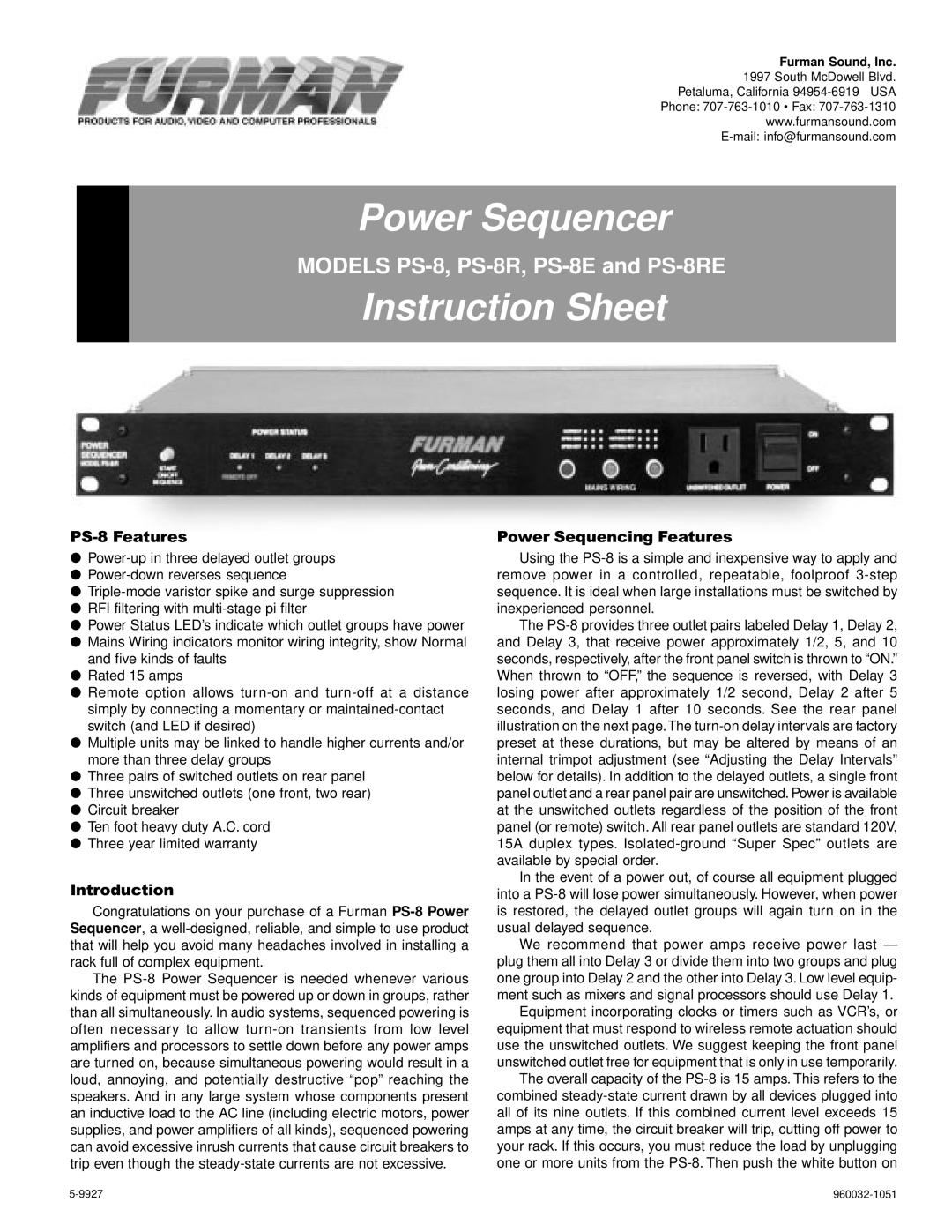PS-8 Features
●Power-up in three delayed outlet groups
●Power-down reverses sequence
●Triple-mode varistor spike and surge suppression
●RFI filtering with multi-stage pi filter
●Power Status LED’s indicate which outlet groups have power
●Mains Wiring indicators monitor wiring integrity, show Normal and five kinds of faults
●Rated 15 amps
●Remote option allows turn-on and turn-off at a distance simply by connecting a momentary or maintained-contact switch (and LED if desired)
●Multiple units may be linked to handle higher currents and/or more than three delay groups
●Three pairs of switched outlets on rear panel
●Three unswitched outlets (one front, two rear)
●Circuit breaker
●Ten foot heavy duty A.C. cord
●Three year limited warranty
Introduction
Congratulations on your purchase of a Furman PS-8 Power Sequencer, a well-designed, reliable, and simple to use product that will help you avoid many headaches involved in installing a rack full of complex equipment.
The PS-8 Power Sequencer is needed whenever various kinds of equipment must be powered up or down in groups, rather than all simultaneously. In audio systems, sequenced powering is often necessary to allow turn-on transients from low level amplifiers and processors to settle down before any power amps are turned on, because simultaneous powering would result in a loud, annoying, and potentially destructive “pop” reaching the speakers. And in any large system whose components present an inductive load to the AC line (including electric motors, power supplies, and power amplifiers of all kinds), sequenced powering can avoid excessive inrush currents that cause circuit breakers to trip even though the steady-state currents are not excessive.
Power Sequencing Features
Using the PS-8 is a simple and inexpensive way to apply and remove power in a controlled, repeatable, foolproof 3-step sequence. It is ideal when large installations must be switched by inexperienced personnel.
The PS-8 provides three outlet pairs labeled Delay 1, Delay 2, and Delay 3, that receive power approximately 1/2, 5, and 10 seconds, respectively, after the front panel switch is thrown to “ON.” When thrown to “OFF,” the sequence is reversed, with Delay 3 losing power after approximately 1/2 second, Delay 2 after 5 seconds, and Delay 1 after 10 seconds. See the rear panel illustration on the next page.The turn-on delay intervals are factory preset at these durations, but may be altered by means of an internal trimpot adjustment (see “Adjusting the Delay Intervals” below for details). In addition to the delayed outlets, a single front panel outlet and a rear panel pair are unswitched. Power is available at the unswitched outlets regardless of the position of the front panel (or remote) switch. All rear panel outlets are standard 120V, 15A duplex types. Isolated-ground “Super Spec” outlets are available by special order.
In the event of a power out, of course all equipment plugged into a PS-8 will lose power simultaneously. However, when power is restored, the delayed outlet groups will again turn on in the usual delayed sequence.
We recommend that power amps receive power last — plug them all into Delay 3 or divide them into two groups and plug one group into Delay 2 and the other into Delay 3. Low level equip- ment such as mixers and signal processors should use Delay 1.
Equipment incorporating clocks or timers such as VCR’s, or equipment that must respond to wireless remote actuation should use the unswitched outlets. We suggest keeping the front panel unswitched outlet free for equipment that is only in use temporarily.
The overall capacity of the PS-8 is 15 amps. This refers to the combined steady-state current drawn by all devices plugged into all of its nine outlets. If this combined current level exceeds 15 amps at any time, the circuit breaker will trip, cutting off power to your rack. If this occurs, you must reduce the load by unplugging one or more units from the PS-8. Then push the white button on

